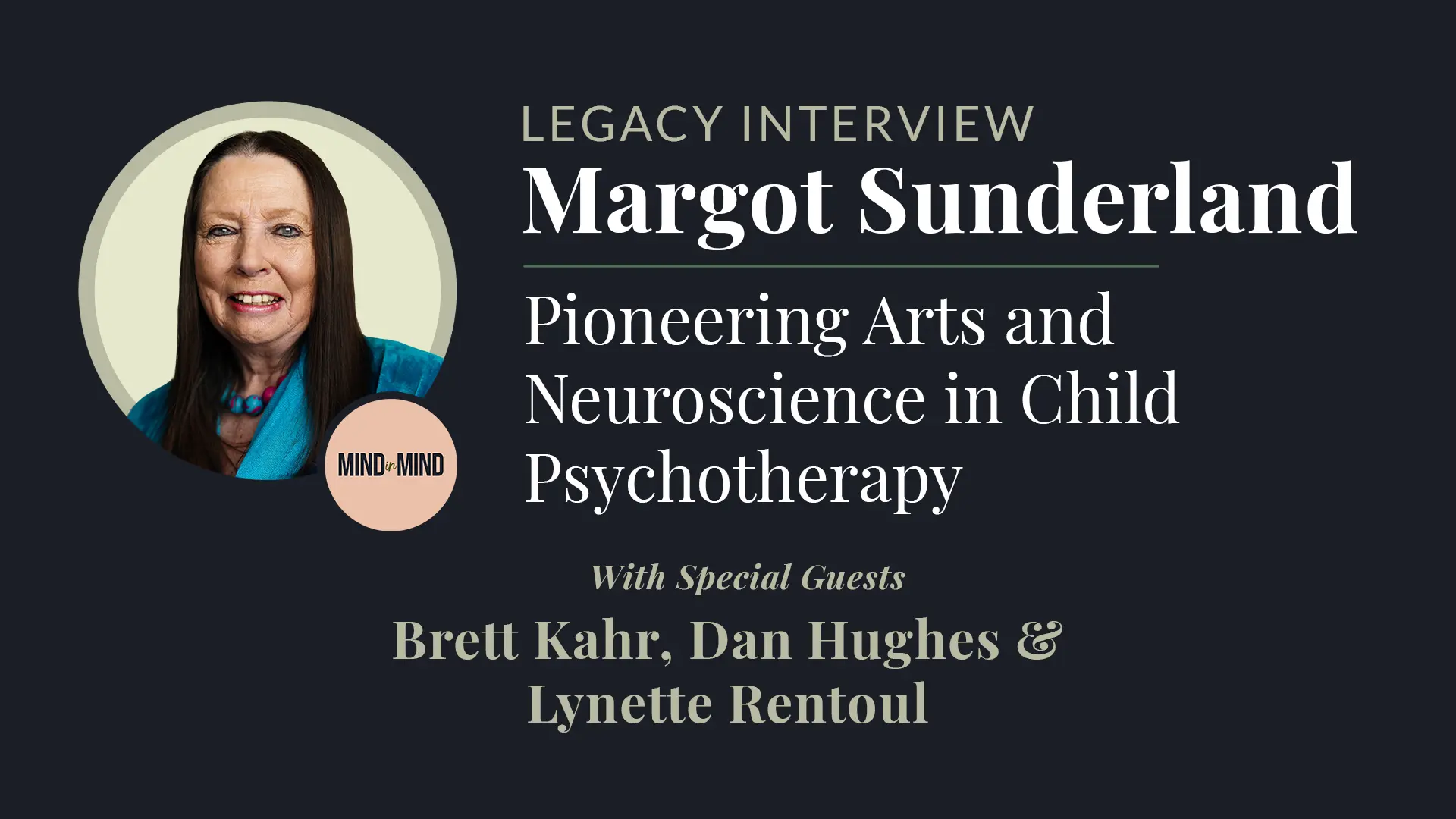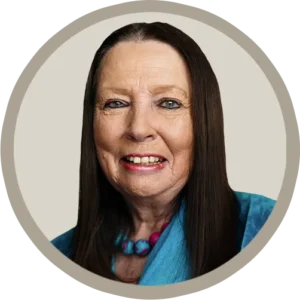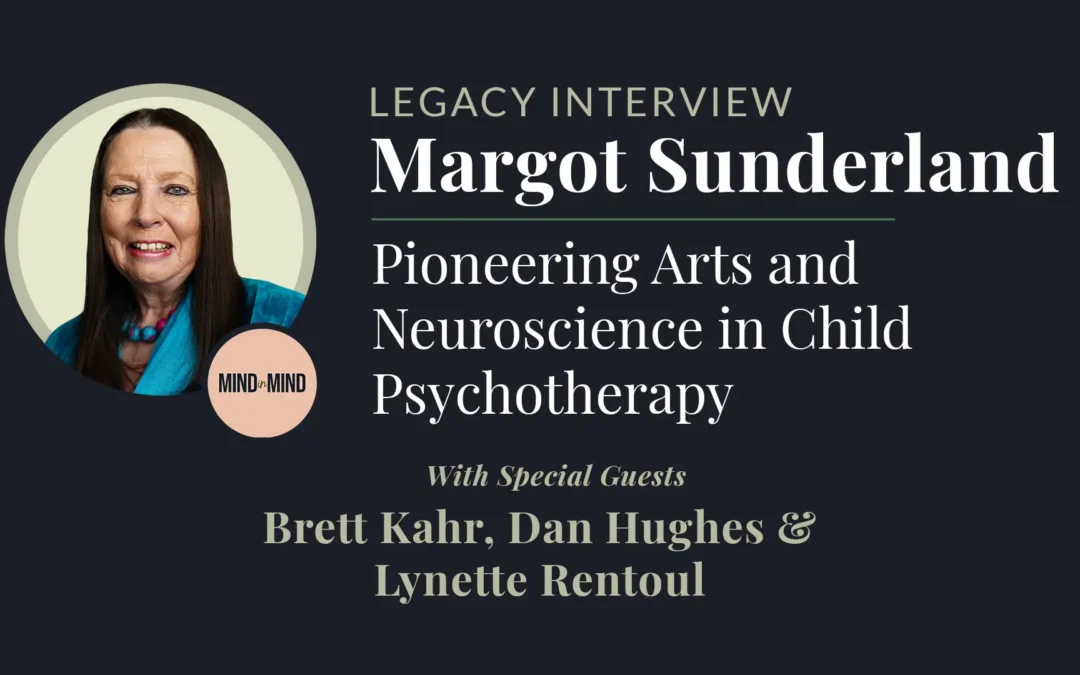
– Watch the full recording for £39 includes a 2 hour CEU/CPD certificate –
Margot Sunderland Legacy Interview
Integrating Neuroscience and the Creative Arts in Child and Adolescent Psychotherapy
Brett Kahr, Dan Hughes & Lynette Rentoul
“Like Freud said, dreams are a royal road to the unconscious. I think the arts are a royal road to the unconscious. They are very powerful.”
Event Highlights
This Legacy Interview offers a unique opportunity to enjoy and learn from one of the field’s most respected voices in child psychotherapy and neuroscience-informed practice. For over four decades, Dr. Margot Sunderland has been a leading figure in transforming how we understand children’s distress, challenging deficit-based models of diagnosis and behaviour management, and instead developing trauma-informed, relational, and arts-based approaches grounded in the latest developments of neuroscience.
The conversation is enriched by the contributions of her special guests Professor Brett Kahr, Dr. Dan Hughes, and Dr. Lynette Rentoul who have collaborated with Margot over decades, offering valuable insights into the development of their own therapeutic practice and their contributions to the field.
Margot shares her understanding of how early experiences influenced her journey from performing arts into psychotherapy, and how these shaped her interest in helping children express and process painful emotions—themes that would become central to her work. She demonstrates key clinical techniques including sandplay therapy and her innovative “Big Empathy Drawing” method, showing how these approaches help children access and transform core emotional pain.
“We know that one emotionally available adult before the age of 18 can stop the trajectory from adverse childhood experience to long-term mental health and early death, just one emotionally available adult. And it doesn’t have to be a therapist.”
The conversation explores important clinical concepts including:
The Fundamentals of Arts-Based Therapeutic Work:
- The power of creative expression in accessing the unconscious: “Like Freud said, dreams are a royal road to the unconscious. I think the arts are a royal road to the unconscious. They are very powerful.”
- How the arts facilitate access to the right brain’s wisdom and emotional processing
- The importance of “show, don’t tell” in therapeutic work with children
- Understanding therapy as a conversation through multiple creative modalities
- The role of therapeutic presence in creating safety for emotional exploration
Working with Different Clinical Presentations:
- With traumatised children: helping them tell their stories through creative means
- With anxious children: providing co-regulation through relationship and creative expression
- With avoidant children: giving them languages beyond words to express painful emotions
- With parents: supporting them to understand their own childhood experiences
Child Psychotherapy Techniques:
- Margot shows how sandplay is a powerful medium for processing trauma
- Margot demonstrates how the ‘Big Empathy Drawing’ facilitates collaborative sense-making with children
- The importance of empathic listening and validation in therapeutic conversations
- Understanding that transformation happens through accessing core pain: “Because in the story is the core pain. You’ve got to get to core pain underneath the defense, and the story will have the core pain. Greenberg says you cannot leave a place until you have first arrived. In other words, you cannot get well until you have first got to core pain.”
- The critical role of one supportive relationship can be in a child’s life
The Science of Emotional Development:
- How early trauma affects brain development and emotional regulation
- The importance of right-brain to right-brain communication in therapy
- How effective therapy can change brain chemistry and neural pathways
- Understanding the neurobiological basis of attachment and its impact on mental health
- The power of therapeutic relationships in preventing long-term damage: “We know that one emotionally available adult before the age of 18 can stop the trajectory from adverse childhood experience to long-term mental health and early death, just one emotionally available adult. And it doesn’t have to be a therapist.”
Special Guest Contributions
Professor Brett Kahr shares insights from their early connection when he was one of Margot’s first students at the London College of Dance. He describes how Margot was ahead of her time in bringing neuroscience into psychotherapy and reflects on how Margot’s courage in establishing the first non-psychoanalytic child psychotherapy training in the UK despite significant opposition, has expanded the field’s capacity to help troubled children.
Dr. Dan Hughes discusses his 25-year collaboration with Margot, highlighting their shared understanding of the importance of accessing “core pain” beneath defensive behaviours. He explains how both their approaches emphasise the need for therapist and child to be together in painful emotions, rather than trying to fix or avoid them. Dan describes how both his Dyadic Developmental Psychotherapy and Margot’s arts-based approaches prioritise intersubjectivity—the shared experience between therapist and child that allows for trust, connection, and emotional healing.
Dr. Lynette Rentoul describes her collaboration with Margot in developing Trauma Informed Schools UK, bringing attachment and neuroscience principles into educational settings across Cornwall and beyond. She explains how this approach has helped teachers understand the emotional pain underlying challenging behaviours, leading to more compassionate and effective responses. Lynette highlights how Margot’s ability to translate complex psychological theories into accessible language and practical tools has allowed thousands of non-clinical professionals to become “emotionally available adults” for vulnerable children. She shares evidence of the programme’s impact, including reduced self-harm presentations and improved school cultures.
Margot Sunderland
 For more than four decades, Margot has been at the forefront of transforming how we understand children’s distress. She is Director of Education and Training at The Centre for Child Mental Health in London and Founding Director of the Institute for Arts in Therapy and Education, a pioneering organisation offering integrative training in psychotherapy, the arts, and child and adult mental health. She’s also Co-Director of Trauma Informed Schools UK, which has trained over 60,000 professionals worldwide.
For more than four decades, Margot has been at the forefront of transforming how we understand children’s distress. She is Director of Education and Training at The Centre for Child Mental Health in London and Founding Director of the Institute for Arts in Therapy and Education, a pioneering organisation offering integrative training in psychotherapy, the arts, and child and adult mental health. She’s also Co-Director of Trauma Informed Schools UK, which has trained over 60,000 professionals worldwide.
Her books, including “The Science of Parenting” and “Conversations that Matter,” have sold over a million copies worldwide and been translated into 18 languages, bringing accessible evidence-based approaches into homes, classrooms, and therapy rooms around the world.
Despite significant opposition from traditional training institutions and professional bodies, Margot has shown remarkable courage and perseverance in creating innovative approaches that have since gained wide recognition, ultimately expanding the field’s capacity to help troubled children and young people.
Her approach emphasises the integration of seven distinct art forms with attachment theory, psychoanalytic approaches, emotion-focused therapy, and neuroscience research. This integrative approach has been a hallmark of her career, playing a pivotal role in shifting the field toward an approach that embraces the profound wisdom of the right brain in both therapist and client.
Perhaps one of Margot’s most important contributions has been her ability to make complex psychological and neuroscientific concepts accessible to both professionals and parents. Her exceptional ability to translate research into practical guidance is evident in her award-winning book, “The Science of Parenting,” which won First Prize in the British Medical Association Medical Book Awards and draws on over 700 scientific studies. It has sold over a million copies worldwide.
Most recently, her film “What Every Teenager Needs to Know About Emotions, Relationships and Mental Health” represents her vision for transforming how mental health is addressed with young people, moving beyond symptom management to genuine healing.
Special Guests
Professor Brett Kahr
 Professor Brett Kahr, Psychoanalyst and author, is Senior Fellow at the Tavistock Institute of Medical Psychology in London and Visiting Professor of Psychoanalysis and Mental Health at Regent’s University London. He also serves as the Honorary Director of Research at the Freud Museum London and is an Honorary Fellow of the museum, as well as the Series Editor of the ‘Freud Museum London Series’ of books on the history of psychoanalysis.
Professor Brett Kahr, Psychoanalyst and author, is Senior Fellow at the Tavistock Institute of Medical Psychology in London and Visiting Professor of Psychoanalysis and Mental Health at Regent’s University London. He also serves as the Honorary Director of Research at the Freud Museum London and is an Honorary Fellow of the museum, as well as the Series Editor of the ‘Freud Museum London Series’ of books on the history of psychoanalysis.
A prolific author and editor, Brett has written twenty-two books and served as series editor for over eighty-five additional titles. His recent works include ‘Bombs in the Consulting Room: Surviving Psychological Shrapnel,’ ‘Freud’s Pandemics: Surviving Global War, Spanish Flu, and the Nazis,’ and ‘Hidden Histories of British Psychoanalysis: From Freud’s Death Bed to Laing’s Missing Tooth.’
Brett is Chair of the Scholars Committee and the Scholars Network of the British Psychoanalytic Council. In 2024, he received the British Psychoanalytic Council’s ‘Outstanding Professional Leadership Award’ and is an Honorary Fellow of the United Kingdom Council for Psychotherapy.
Brett has been a key collaborator of Margot Sunderland for over three decades, having first met her in 1988. He played a pivotal role in the founding of the Centre for Child Mental Health (CCMH), and in 2004, Brett became its Senior Clinical Research Fellow in Psychotherapy and Mental Health. He has lectured extensively for both the Institute of Arts in Therapy and Education (IATE) and the CCMH, organisations founded and directed by Margot.
Their professional relationship represents a productive alliance between established psychoanalytic traditions and innovative, neuroscience-informed approaches to mental health, particularly benefitting the advancement of child and adolescent psychotherapy in the UK.
Brett Kahr says: “Few mental health practitioners in the United Kingdom have enhanced the profession as much as Dr. Margot Sunderland has done. A woman of great inspiration, she has expanded the field of child and adolescent mental health as well as the field of the creative arts therapies more than anyone else in recent decades. Our community owes her much gratitude for having trained and supported so many hundreds of new colleagues.”
Dan Hughes
 Dan Hughes is an internationally renowned clinical psychologist who developed Dyadic Developmental Psychotherapy (DDP), an innovative approach for working with children who have experienced trauma, abuse and neglect.
Dan Hughes is an internationally renowned clinical psychologist who developed Dyadic Developmental Psychotherapy (DDP), an innovative approach for working with children who have experienced trauma, abuse and neglect.
His therapeutic model integrates attachment theory, neurobiology and intersubjectivity, providing a framework for supporting troubled children, of particular benefit to children from the care system and their carers. The approach is centred around what Dan calls “PACE” – Playfulness, Acceptance, Curiosity and Empathy – qualities that help co-regulate trauma and construct new meanings of difficult experiences.
Dan has been a key figure in Margot Sunderland’s educational initiatives, serving as one of her principal child psychotherapy tutors. Their collaboration represents an important bridge between attachment-focused therapy and neuroscience-informed approaches. Dan’s DDP methodology complements Margot’s integration of arts and neuroscience in therapeutic interventions, particularly in their work with looked-after children and those who have experienced developmental trauma.
Developed in the 1980s and continuously refined since, DDP has become influential worldwide, particularly for supporting children in foster care and adoptive families. Dan observed that traditional therapeutic approaches often failed with these children, prompting him to create an attachment-focused alternative that emphasises creating safe, emotionally connected relationships.
Through his books, including the seminal ‘Building the Bonds of Attachment’ and ‘Attachment-Focused Family Therapy Workbook’, and his extensive training programmes, Dan has significantly influenced how therapists approach work with traumatised children. He has become an important theorist and inspiring practitioner who demonstrates the healing potential of genuine human connection.
Dan Hughes says, “Margot has done so much for the field—in child mental health, neuropsychology, inspiring therapeutic books for children and parents, training and teaching professionals in mental health and education. She is a mentor and friend to many—a treasured gift to us all.”
Dr Lynette Rentoul
 Dr Lynette Rentoul is a clinical psychologist and adult psychoanalytic psychotherapist and former lecturer in Psychology at Kings College London. Her clinical work has been with both adults, at the Cassell Hospital in London and children and adolescents in a variety of NHS in-patient and community settings.
Dr Lynette Rentoul is a clinical psychologist and adult psychoanalytic psychotherapist and former lecturer in Psychology at Kings College London. Her clinical work has been with both adults, at the Cassell Hospital in London and children and adolescents in a variety of NHS in-patient and community settings.
She has combined her interest in psychoanalysis, child development, developmental psychopathology, attachment theory, and affective neuroscience in her work for over 30 years in these clinical settings.
Lynette has collaborated with Margot since Trauma Informed Schools UK was established, playing a pivotal role in developing the theoretical framework to address the escalating mental health crisis among school-aged children.
She worked in New York City, supporting the mental health response to children and their families impacted by the terrorist attack in September 2001, providing oversight of training and service delivery to thousands of children and young people. She also worked in Iran, supervising mental health staff, who provided much-needed crisis mental health support to children and families impacted by the Bam earthquake.
She was a member of the Department of Health Working Party and the British Psychological Society Expert Group developing guidelines for disaster response planning for children and young people.
Her most recent project was the roll out of an ambitious training programme to support Early Help staff understand and attend to the needs of children, young people and their families and stem the increase of children whose mental health needs reach crisis levels before they are attended to.
Dr Lynette Rentoul says, “Margot’s work has shaped my understanding of attachment, developmental psychopathology, and neuroscience through her insights on brain-mind systems affecting children’s emotional and prosocial development, including their capacity for learning and peer relationships. Her ability to make affective neuroscience and attachment theory accessible through the Trauma Informed Schools (TIS) training is both impressive and vital. Children who experienced early trauma often struggle at school, risking exclusion. TIS training embeds relational approaches, helping staff provide understanding and effective support in trauma-informed ways.”
Interviewer
Margot was in conversation with Jane O’Rourke.
Jane O'Rourke – Founder of MINDinMIND and former award-winning BBC journalist turned Child and Adolescent Psychotherapist. Jane brings a unique skill set to create rich and thoughtful conversations, weaving together the personal and professional threads of her guests' journeys.
Details correct at time of recording – 30 April 2025
Bibliography & Resources
Publications:
Books
- Sunderland, M. (2016). What Every Parent Needs to Know (revised edition). London: Dorling Kindersley.
- Sunderland, M. (2015). Conversations that Matter. London: Worth Publishing.
- Sunderland, M. (2006). The Science of Parenting. London: Dorling Kindersley. (First Prize, British Medical Association Medical Book Awards)
- Sunderland, M. (2018). Draw on Your Emotions (2nd edition). London: Routledge.
- Sunderland, M. (2008). Draw On Your Relationships. Oxford: Speechmark Press.
Children’s Books (Therapeutic Stories)
- Sunderland, M. (2003). Ruby and the Rubbish Bin. Oxford: Speechmark Press.
- Sunderland, M. (2003). The Day the Sea Went Out and Never Came Back. Oxford: Speechmark Press.
- Sunderland, M. (2001). A Nifflenoo Called Nevermind. Oxford: Speechmark Press.
- Sunderland, M. (2001). Willy and the Wobbly House. Oxford: Speechmark Press.
- Sunderland, M. (2004). How Hattie Hated Kindness. Oxford: Speechmark Press.
Therapeutic Resources
- Sunderland, M. (2021). Helping Children Talk About Their Lives (booklet and cards). Wadebridge: Armstrong and Sunderland.
- Sunderland, M. (2019). Helping Teenagers Talk About Their Lives (booklet and cards). Wadebridge: Armstrong and Sunderland.
- Sunderland, M. (2018). The Emotion Cards. London: Routledge.
- Sunderland, M. (2018). The Relationship Cards. London: Routledge.
- Sunderland, M. (2003). Helping Children with Low Self-Esteem. Oxford: Speechmark Press.
- Sunderland, M. (2003). Helping Children with Fear. Oxford: Speechmark Press.
- Sunderland, M. (2003). Helping Children with Loss. Oxford: Speechmark Press.
- Sunderland, M. (2001). Using Storytelling as a Therapeutic Tool with Children. Oxford: Speechmark Press.
Films/DVDs
- Sunderland, M. (Director). (2024). What every teenager needs to know about emotions, relationships and mental health [Film]. Redshark TV.
- Sunderland, M. (2015). Best Relationship with your Child: The First Five Years [DVD]. Redshark TV.
- Sunderland, M. (2015). Best Relationship with your Child: Creative Quality Time [DVD]. Redshark TV.
- Sunderland, M. (2015). Best Relationship with your Child: age 5 to 12 [DVD]. Redshark TV.
Margot Sunderland’s publications have been translated into 18 languages and published in 24 countries worldwide, reaching millions of readers across different cultures and contexts.
“Because in the story is the core pain. You’ve got to get to core pain underneath the defense, and the story will have the core pain. Greenberg says you cannot leave a place until you first arrived. In other words, you cannot get well until you first got to core pain.”



Recent Comments